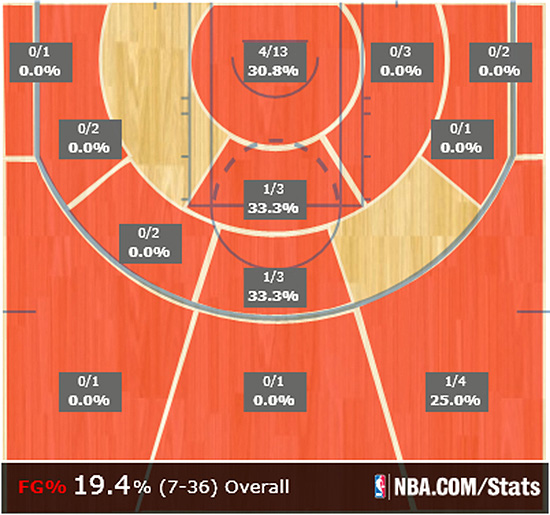The Boston Celtics went 7 for 36 from the floor in the second half of their 87-71 Game 2 loss to the New York Knicks on Tuesday night. That's 19.4 percent. That sounds bad. It looks even worse:

Yikes.
The misery was spread throughout the roster, with Brandon Bass, Jeff Green, Avery Bradley, Jason Terry and Terrence Williams missing every shot they took after halftime, leading scorer Paul Pierce missing six of his nine tries, first-half spark-plug Jordan Crawford missing five of seven and Kevin Garnett missing four of six. All that red translates into a 23-point second half for the Celtics, tying the NBA record for fewest points in a half of a playoff game, held by the 1997-98 Utah Jazz (who scored 23 in the second half of their loss to the Chicago Bulls in Game 3 of the NBA Finals) and the 1999-2000 Phoenix Suns (who managed 23 in the first half of a postseason-ending loss to the Los Angeles Lakers). And that translated into a deficit too large to overcome, a hole dug by a massive 24-4 New York run from the beginning of the second half through the 4:25 mark of the third quarter that permanently tilted the game away from Boston.
Tuesday's drought came one game after Boston put up just 25 points (including a dreadful eight in the fourth quarter) in Saturday's Game 1 loss, making the Celtics the first team in the shot-clock era to score 25 or fewer points in consecutive halves, according to Hoopsworld's Tommy Beer. We're guessing that stat won't be given too prominent a place in the annals of Celtic lore.
Celtics coach Doc Rivers attributed Garnett's lack of rhythm, in part, to some "horrendous" whistles that kept him in foul trouble for most of his 24 minutes and said Pierce tired in the third and fourth due to having to bear the playmaking burden for a team whose only real primary facilitator watched in street clothes.
Rivers blamed himself for not getting his Celtics into the "right spots" offensively, but it's unclear which spots those would have been. After the game, the Knicks and coach Mike Woodson repeatedly attributed the second-half shutdown to increased focus and intensity, which is fair, but it was intentionally applied in a pair of specific areas — wing defenders Iman Shumpert and Raymond Felton crowding Pierce in his office at the foul line and elbows so he couldn't get separation to rise and fire or attack the basket, and interior defenders Tyson Chandler and Kenyon Martin extending their contesting in the paint to help prevent Green from getting all the way to the rim.
But while some credit certainly belongs to the Knicks' defensive effort, as CelticsBlog's Jeff Clark notes, a lot of this seems like bad Celtics offense, too. With Pierce and Green stymied, the combination of Terry re-entering the freezer after showing an early flicker of warmth from beyond the arc and Crawford's coin-flip off-the-dribble steez coming up tails again meant that, for the second straight game, there wasn't anything the Celtics could really rely upon after halftime, a point that stuck out like a sore thumb to Gary Washburn of the Boston Globe:
Boston’s problem is it cannot create any easy baskets. The Celtics work overtime to score, and when shots fall, they appear capable. When they don’t, they don’t have any other options. They can’t get to the free throw line. They have erratic finishers and they don’t shoot well from the 3-point line.
Add to that a seemingly inexplicable lack of passion in this series, and you have a team that’s fried, its superstars too old to carry games and the youth too daunted by the moment. [...]
The Celtics just don’t have enough offensive prowess. Jordan Crawford has emerged as their primary bench scorer, they don’t have a capable backup center who can score, play defense, or block shots, and let’s not even discuss the lack of a capable backup point guard.
The Celtics are flawed, and against teams who are good and relentless and well-coached, they are exposed quickly.
And while it remains too early to write the Celtics off completely — as many, including SB Nation's Paul Flannery, have noted, the Celtics are a very different team at home and figures to be riding an extraordinarily emotional high when they return to TD Garden for the first time since the Boston Marathon bombings for Friday's Game 3 — it does seem fair to wonder whether Boston's now-historic second-half struggles indicate that the team's near future is neither bright nor likely to last very long.
No comments:
Post a Comment